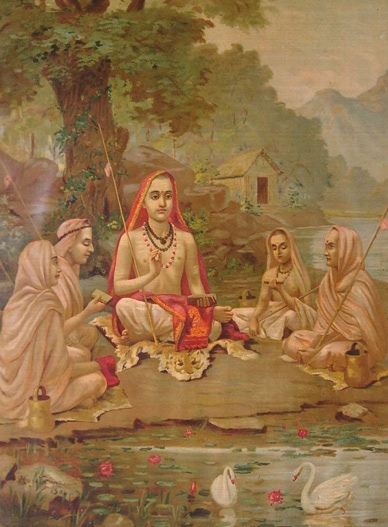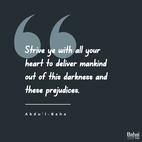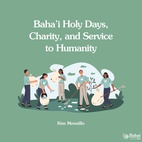The views expressed in our content reflect individual perspectives and do not represent the official views of the Baha'i Faith.
Once you’ve sought a glimpse of God in the natural beauty of the outdoors, you’ll want to go in the opposite direction, too – and look within yourself.
Speaking metaphorically, scripture declares that there is: “One God and Father of all, who is above all, and through all, and in you all” (Ephesians 4:6).
That beautiful passage tells us that we can find the highest expression of God within ourselves, because “the kingdom of God is within” (Luke 17:21). This “God within” the Hindus call Atman, and their scripture reveals its closeness to us, especially in the following story between a father and a son:
Raja Ravi Varma
“Be it so. Put this salt in water, and come to me tomorrow morning.”
Svetaketu [the son] did as he was bidden. The next morning his father asked him to bring the salt which he had put in the water. But he could not, for it had dissolved. Then said Uddalaka [the father]:
“Sip the water, and tell me how it tastes.”
“It is salty, sir.”
“In the same way,” continued Uddalaka, “though you do not see Brahman [God] in this body, he is indeed here. That which is the subtle essence in that have all things their existence. That is the truth. That is the Self [Atman]. And that, Svetaketu, That art Thou.” Chandogya Upanishad 1114 In The Spiritual Heritage of India , Swami Prabhavananda, Vedanta Press, 1979. p. 5758.
In such a way God is always with us. We are not salt, but we are salty. We are not, however, alone with the God within.
Instead, our interior landscape is cluttered with a hundred other things, and these other things sometimes manifest in ways that harm us. “Evil thoughts, adulteries, fornications, murders, thefts, covetousness, wickedness, deceit, lasciviousness, and evil eye, blasphemy, pride, foolishness: All these evil things come from within, and defile man” (Mark 7:2123).
If we want to find God within, we must work to remove those things that do not belong there. This is hard work. Baha’u’llah proclaims: “labor is needed, if we are to seek Him; ardor is needed, if we are to drink of the honey of reunion with Him” (The Seven Valleys p. 7).
Every human being has good qualities and qualities that need work. We’re all made up of noble traits and not-so-noble ones, and we all struggle to become better people as our lives move forward – to develop spiritual virtues and perfections. The Baha’i teachings have a particularly apt description of this process:
The rewards of this life are the virtues and perfections which adorn the reality of man. For example, he was dark and becomes luminous, he was ignorant and becomes wise, he was neglectful and becomes vigilant, he was asleep and becomes awakened, he was dead and becomes living, he was blind and becomes a seer, he was deaf and becomes a hearer, he was earthly and becomes heavenly, he was material and becomes spiritual. Through these rewards he gains spiritual birth, and becomes a new creature. He becomes the manifestation of the verse in the Gospel where it is said of the disciples that they were born not of blood, nor of the will of the flesh, nor of the will of man, but of God; that is to say, they were delivered from the animal characteristics and qualities which are the characteristics of human nature, and they became qualified with the divine characteristics, which are the bounty of God; this is the meaning of the second birth. – Abdu’l-Baha, Baha’i World Faith, p. 323.


















Comments
Sign in or create an account
Continue with Facebookor